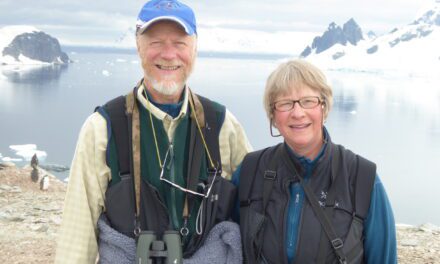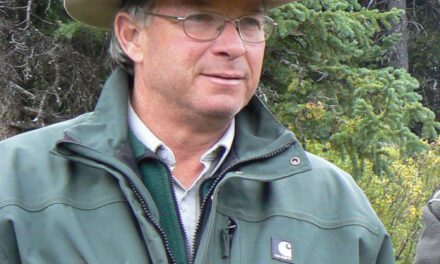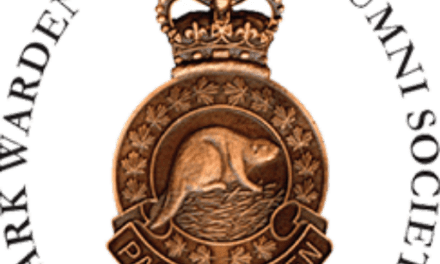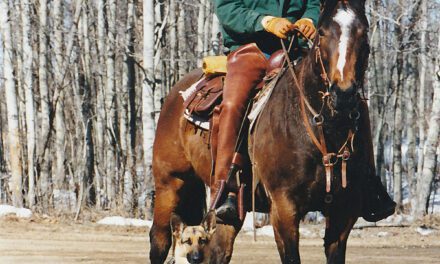SH: Wow, that’s a tough story.
Doug: We had situations like that. It was very difficult.
Faye: There was a funny one in Riding Mountain. The couples travelling….
Doug: Oh yes, that was a funny one. I got a report one time …. at the north end of Riding Mountain there was a tower where you could get up and look across the valley and everything. I got a report that there were two women up there. They had no vehicle so no way to get there. So I went up there and found them, and I started talking to them. They said they were on their way back to Winnipeg with their husbands and another group. There were two vehicles and they’d stopped there for a break. The two husbands went for a hike. The two ladies went up the tower and the third couple in the other car drove away. So, the two men came back, and the women weren’t there, and the other car was gone so they thought “Oh well, they all took off”. So they hopped in another car and drove away, leaving these two women stranded up there. So, I took them to town where they could get on the phone and find out where their husbands were and tell them to come back and pick them up. They didn’t have any money or anything, so I gave them some money, so they could get something to eat. They were going to be waiting about three or four hours for their husbands to come back. It was so funny.
SH: Great story. I like that. Do you have any other stories that you jotted down that you’d like to talk about?
Faye: You were talking about Art Cochrane and you riding….
Doug: Yes, this was a funny but serious story too. Art Cochrane and I were going to pack some lumber in to build a tent structure, so we had these long 2 x 4’s. We thought that since were going riding through some very thick bush we thought we should run these 2 x 4’s up at an angle so they would cross over the horse’s head. That way they wouldn’t get caught up in the shrubs. So, we got them all tied on and Art was going to lead this pack horse.
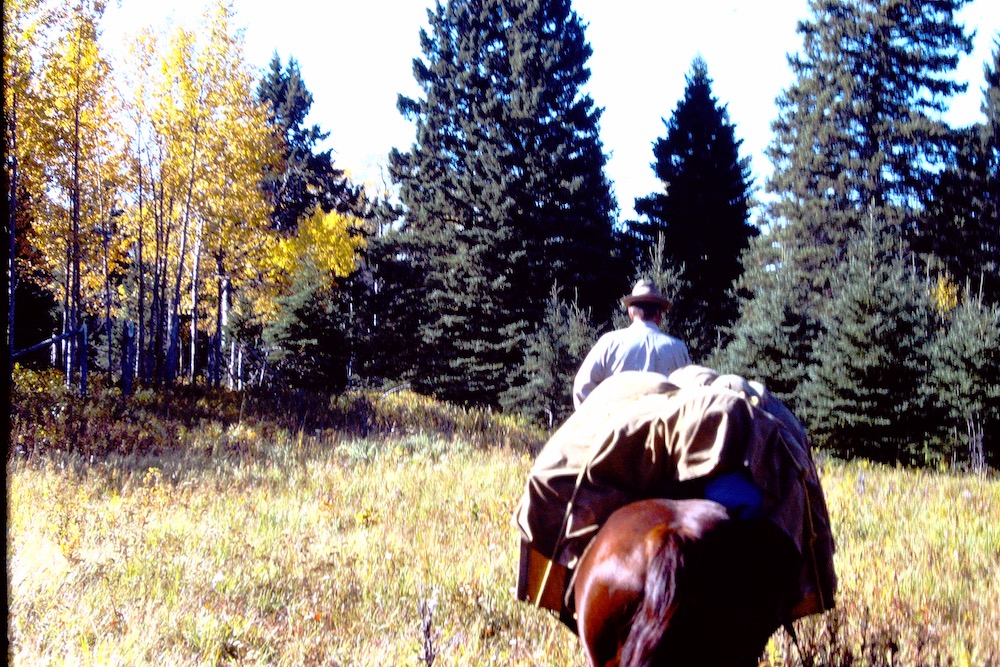
A park warden on horse patrol in Riding Mountain National Park.
He just got on and ready to go, and I was in behind and hadn’t even got on yet. A horse fly came around and started bothering the pack horse. So, the pack horse tried to kick it on its belly where it was biting him. Well that reaction caused the 2 x 4’s to come down and hit him on top of the head. That scared the pack horse, so he started moving down the trail to get out of there. Art’s horse was trained in racing so as soon as this horse went by him he thought the race was on. Away Art’s horse and the pack horse went down the trail, as hard as they could go. I was thinking this was going to be a mess. I got to give Art a lot of credit as a great rider. He held on and pulled that horse off the trail into the bushes. They were going around in the thick, thick bushes. They were going around in circles and finally the 2 x 4’s started flying off. But the pack horse calmed down and Art came back on the trail still on his horse. That was quite an experience. I think another person would have had a terrible wreck.
SH: What a rodeo.
Doug: Yes, it was amazing. We packed the 2 x 4’s back up, just straight across thinking they are going to get stuck anyways. We got them down, but it was fun.
Faye: How about the one helping the RCMP with the boater in Sandspit?
Doug: Oh yes. In Gwaii Haanas we kept a boat part way down the island, in the water ready to go. The RCMP called on us to help them with any searches or problems that would happen down that way because we could respond right away, and we knew the water and everything. We got one report of an old fellow who had gone out fishing and didn’t come back.
So, we went down after dark figuring we would go look for him. So, we drove around all night looking for him because we didn’t know where he’d gone fishing, and didn’t see him at all until the sun came up the next morning, and there he was just down the bay a little ways. We went and got him and he’d been rowing back from the bay outside all night, so we said “Hop in we’ll give your boat a tow.” He didn’t want us but the RCMP insisted and we got him into the end of the dock and we were asking him what happened.
He said something was happening with the motor and it wouldn’t run. It runs fine but it wouldn’t push the boat anywhere. So there I was rowing. So, we helped him take his boat out of the water, and when the prop came out it was just ratched all to pieces. He had hit a rock and completely destroyed his propeller. He wouldn’t admit that he did that.
In the islands, quite often we’d have mushroom pickers come up every year and they are very bad for getting lost. They always have their heads down and not looking at where they are going. So, this was another opportunity. They weren’t picking the mushroom inside of the park, they were outside of the park, but every year one or two of them would get lost. Who was it to go help search for them but the wardens because we had the experience and the ability to go and search and we did that fairly often. I remember one situation was … quite often these guys would start at a lake and get up on a ridge and see water down further south which was actually the ocean inlet, and mistake it for the lake, and hike down there. Then we’d go down the shoreline of the inlet and find them and pick them up and take them back.
We had one guy, he got down to the inlet and that wasn’t enough for him. We always thought that the inlet was a barrier, and no one would ever go across that. But, this guy had built a raft and he floated and paddled it across the inlet. We actually found him a day later on the next island to the south. One incident where you should never underestimate lost people.
SH: How did the Warden Service change over the years? – centralization, affirmative action, focus on public safety, changes in 1990s & 2000’s
I was hired on after everybody was centralized, so that had already changed but I think when I got hired on the change of having an education, being educated was changing and over the years that had changed. In recent years that has gone that way even more and more, where we are hiring people with advanced degrees, and depending on them much more than it used to be when a warden with an interest in something. That’s in research and wildlife management. Some of the others are becoming more specialized and I think they are doing the work better because they are specialized. It is not the full time warden that we used to have so that’s is changing, but they are doing a good job. So, the warden that was involved in everything, is a thing of the past.
SH: What about the Warden Service was important to you? – Idea of protecting and preserving national parks, keeping people safe etc. (Tape 48:09)
Doug: I always thought it was very important, it was the group that really protected parks because we enforced laws that prevented damage to parks, and things like that. I always thought they were very important, and still are a critical part of parks, and park management.
SH: Are there any legends or stories associated with the Warden Service that you can share? Is there anyone from the Service that stands out in your mind?
Doug: I guess I worked with Ray Frey quite a bit. I always enjoyed working with him a great deal. There was so many. Every park that I went to …. I was at the age, starting at the early years. I mentioned about back in those early years we hired wardens that could ride but one of the sources that we hired from were veterans from the war … the second World War.
In Prince Albert, a number of the wardens there had been in the army and when they came back to Canada after the war, they were offered jobs in Parks.
Faye: They stuck with those jobs for forty some years.
Doug: Yes, they would stick with those jobs for a great many years. I worked with some of those and like I said, they had a lot of war experience.
SH: I would imagine they’d have some good stories.
Doug: Yes, they would. If you remember Hal Shepherd was part of that group. He was an interesting guy who ended up in a prison of war camp in Japan. They had a hell time. If somebody wanted to know more about that, you should talk to Duane West. He got to know him really well and had heard his story.
Faye: I don’t know if you have Duane West on your list, but he would be a character to talk to in himself.
Doug: He is a good story person and did a lot of really unusual things. He would be very interesting.
SH: Is there anything about the Warden Service, as you knew it, that you would want future generations to know?
Doug: No can’t think of anything right now. I don’t have much more to say I don’t think.
SH: Do you have any lasting memories as a Warden? Favorite park, cabin, horse, trail, humourous stories, etc.
Doug: Well, I met Faye and married her in Waskesiu. We were married in the community hall in Waskesiu.
SH: Did you guys have kids?
Faye: Yes, we had two kids that were very lucky to have grown up in Parks. They were born in the Yukon while we lived in Destruction Bay, so we managed to make it into Whitehorse for both of the births, even though people told us to get the heck in beforehand, but we were fine. They were very fortunate to be able to grow up in all those places, and experience things.
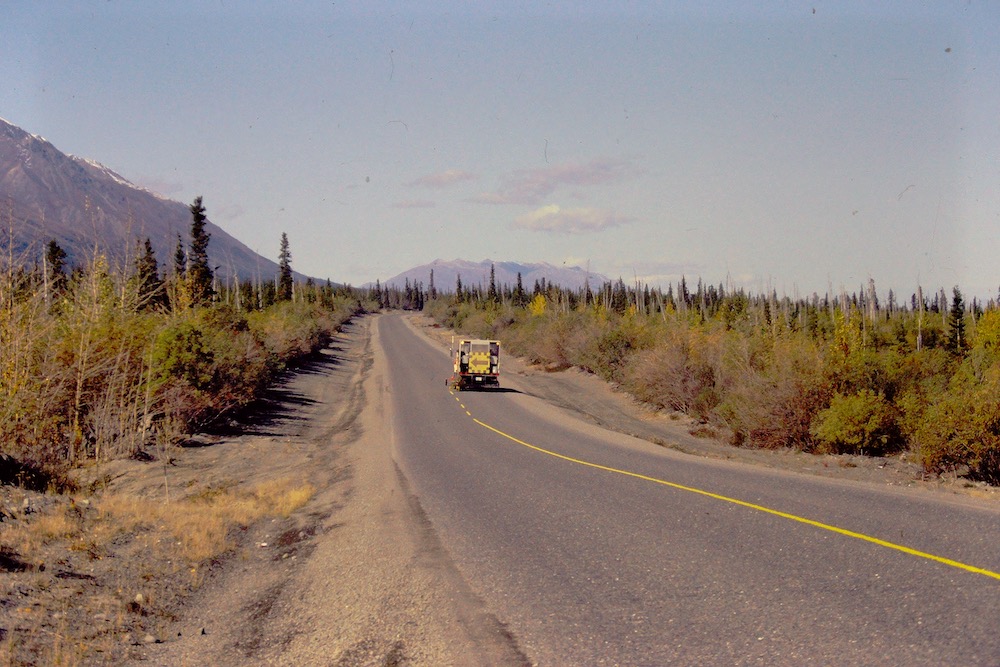
Painting the first lines on the Alaska Highway near Destruction Bay, Yukon (Mile 1083), October 1981.
SH: Are you kids involved in the outdoors still?
Faye: Oh, for sure, they love to come back to Sandspit as much as they can and they like to camp and fish. We have two grandkids, and our grandson especially loves fishing and boats, and all the kids love the wildlife and everything.
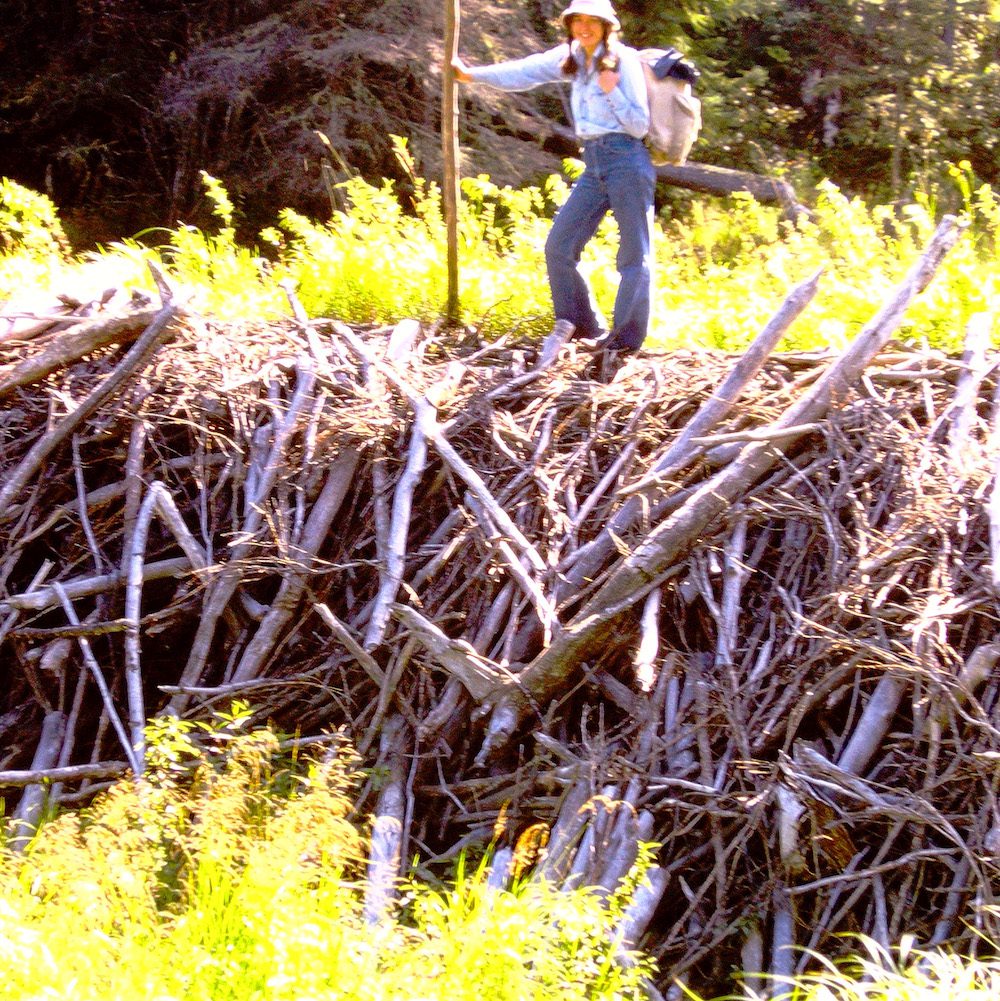
Wolverine CAMERA
Faye on foot patrol with Doug, crossing the McLellan River, Prince Albert National Park.
SH: Do you ever miss being a Warden?
Doug: Sometimes I miss the opportunities to do all these trips, but I also remember having some terrible trips, and hard work and a lot of time. So I’m glad I retired.
SH: What year did you retire? What do you enjoy doing in retirement?
Doug: I retired in 2009. We still own a house up in Sandspit and usually go there in the summertime and go fishing. We have a boat and we like to go fishing quite a bit. We like to travel internationally too when we can.
SH: Yes, back I the days before Covid.
Faye: Doug still does lots of bat work. He was the community bat program contact for this region and for Haidi Gwaii for quite a few years and still does some of his own research right now.
SH: So, you live in Kamloops in the winter but go to Sandspit in the summers then?
Doug: Yes, that’s right.
SH: Is there anything I haven’t asked you that you think I should know about the Warden Service? And Faye please add anything from your perspective as well.
Faye: One thing that always comes to mind and when I talk to people here about it they don’t understand, but as part of Doug’s job he had to live in government housing. And part of that is we always had the park radio on. That was part of life. The park radio was on all the time, even when Doug wasn’t home, I’d have the park radio on in the background. I heard lots of things. One time when we were in Destruction Bay and Doug was away, there was a call from somebody who was climbing a mountain in the park there. I don’t remember which mountain it was, but I think that I was the only one that could actually hear the call. So, I was always aware of that sort of thing, and would pass on to whoever, that sort of thing. We also had the emergency calls by telephone and for some reason that I never understood, the phone was always on my side of the bed, so I was always the one that answered the phone in the middle of the night.
The one time I do remember, the park radio wasn’t working properly so I missed the call when Doug was climbing with a group of other wardens doing some training, and a rock came down and hit him on the side of the head, so he was flown out to Whitehorse.
I didn’t hear that, and it was probably really lucky that I missed it that one, because I would have been completely stressed out. It wasn’t too serious of an injury.
SH: Well I think you’ve done a fabulous interview Doug.
Doug: I’m glad to get it all written down. I can’t quite tell the stories.
Faye: If Doug was sitting down with a couple of guys and a few beers he’d have even more to say. I remember a few times where we’d have people for supper and they’d get in the corner and talk about warden experiences. It’s always interesting to hear that.
SH: Yes, and I liked your comment Faye about the unpaid warden wives that basically were unpaid help for many things.
Doug: For sure, when we were in the Yukon, we lived on the highway near the north end of Kluane. I was away from home one time and during the night there was a knock on the door and Faye went. There had been a car accident, just down the road so she had to deal with that.
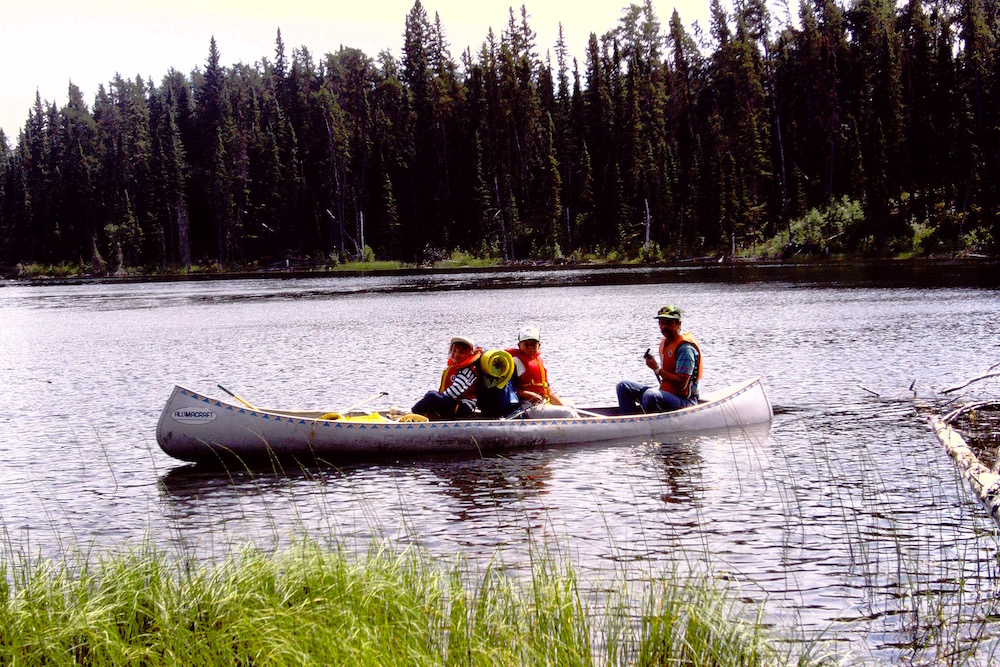
Doug, Lee and Merediith on the Bladestone Canoe
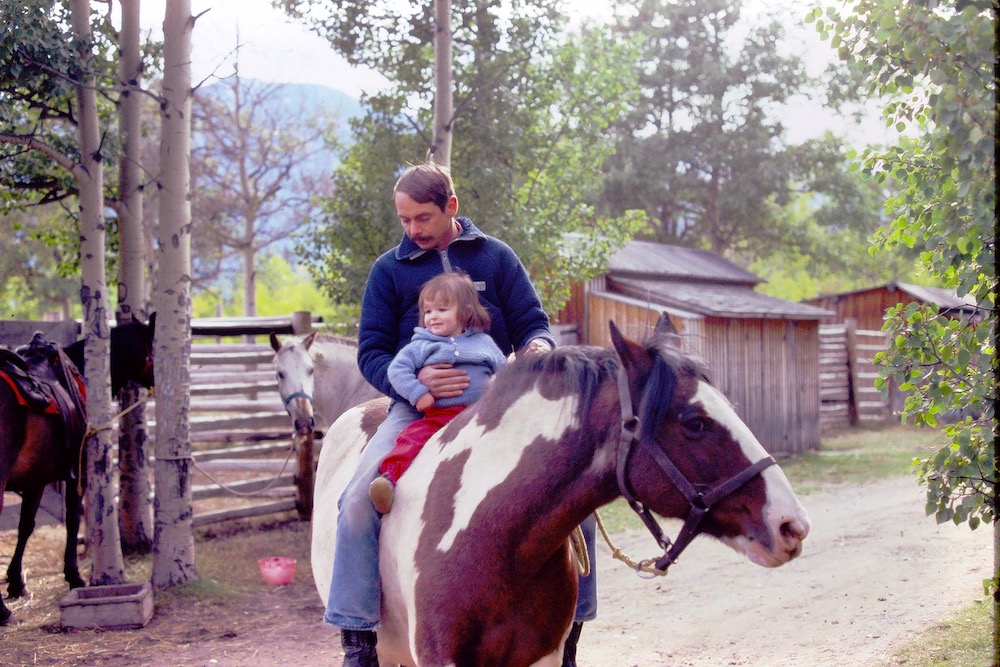
Doug and Meredith riding Granddad’s horse Mousie in Banff 1983.
Route, Prince Albert National Park 1989.
Faye: I was kind of like a mother grizzly bear, because there was this guy at the door and I had a one year old kid at the time, and I didn’t know what to do, but it turned out he just needed help. I remember how angry I was at first that someone would dare to hammer on the door in the middle of the night. (Tape 1:02:29)
SH: Is there anyone else I should talk to?
Doug: Duane West
SH: Do you have any photos of yourself as a Warden that you would like to donate to the Project, or that we may copy? Do you have any artifacts/memorabilia that you would like to donate to the Project (Whyte Museum)
We discuss how to scan pictures and what should be included, and I offer to send Doug some other stories of people (Ray Frey, Lloyd Freese), and mention the Warden Alumni site.
End/sh
This interview was conducted by Susan Hairsine.
Susan Hairsine worked for over 30 years for Parks Canada in Resource Conservation and Operations in Mt. Revelstoke/Glacier, Jasper and Banff national parks. She also worked for Public Safety in Western and Northern Region. She was also the Executive Assistant to the Chief Park Wardens of Jasper and Banff national parks. During her career she obtained funding for an oral history of Parks Canada’s avalanche personnel. Her experience working with several of the interviewees during her and their careers has been an asset to the oral history project.
